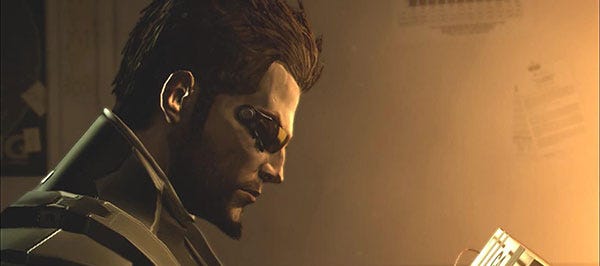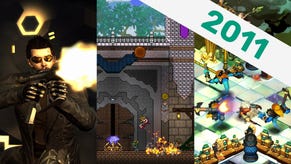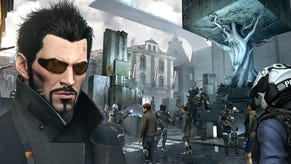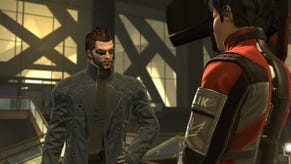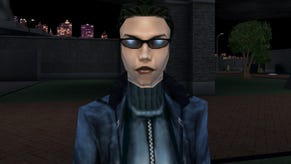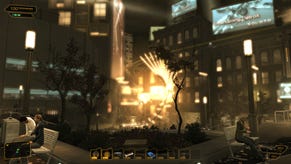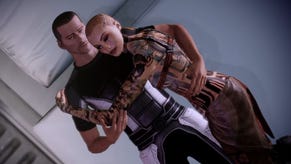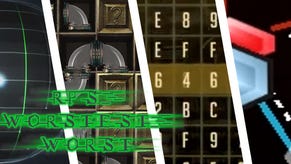I Am Not Adam Jensen
One body, two minds
Please note: this includes some small spoilers, but none of them relate to the game's core plot.
I am not Adam Jensen, and Adam Jensen is not me. Our goals are not aligned.
This is not a complaint. This is exactly why Deus Ex: Human Revolution has been the mainstream game I’ve been most obsessed with this year. Jensen’s goals are these: to avenge his girlfriend and to serve his employer. These goals change over time, and most importantly become far bigger than such comparatively petty interests. They also don’t get in the way of my goals.
My goals are these: find everything, upgrade everything, read everything, buy everything, hack everything, don’t kill anyone. I am free to do them, and I did them compulsively for tens of hours. At the same time, I’m not terribly invested in why I’m doing these things, from the game narrative’s point of my view. I want to know how it all plays out, but being a dutiful employee and a dutiful boyfriend - those are Adam Jensen’s goals, not mine.
One of the smartest things Deus Ex 3 does, in contrast to its revered forebear, is to trim the crazier fat - to throw out the vast majority of the wildest sci-fi facets (greasels and grays, I’m looking at you) and conspiracy theories in favour of laser-focusing on mechanical augmentation of human beings, and the moral, political and industrial repercussions of this. The downside of this sensible story streamlining, or at least of DX3’s particular and often low-key approach, is that, at least at first, it loses some of videogames’ traditional world in peril/only you can save it element, and how that can make you attach to your character and their purpose.
In DX3, at least at first, all you’re doing is your job: corporate security. You're not the saviour of the goddamned universe, you're some shmoe doing his job. You’re defending the interests of your employer, with even the vengeance/answers quest relegated to a secondary interest for the longest time. To add insult to injury, you don’t even seem to draw a paycheque for your job (your wage is mentioned occasionally, and I'm guessing it's lucrative given the success of Sarif Industries and the fact that working for them cost you all your limbs, but I'll be damned if I can find a way to get these surely substantial monies), so instead you find yourself stealing credits from hobos in order to afford guns and augmentation upgrades to help do your job better. That’s apparently a peril for any roleplaying-inclined game that has you as an employee rather than a lone agent - see the original Mass Effect’s having your purchase weapons from a subordinate working in your own ship’s basement.
So: I do not have the interests of a corporate security chief, I do not have the income of a corporate security chief, I am not a corporate security chief. I am not Adam Jensen. I have my own rules. I have my own agenda. And that's mostly related to scavenging and hacking.
Fortunately, Adam’s agenda rarely interferes with mine. Outside of cutscenes and getting shot, Jensen rarely reacts to what he discovers or does. Whether it’s discovering dark truths about his own origins - something the game oddly does within a side-quest rather than the main storyline, which at a guess is the devs trying to not bog down those players who want to blood’n’guts their way through the game at high speed - robbing his colleagues’ offices or pointlessly murdering prostitutes, Jensen simply does not give a shit. He cares about protecting his employer’s corporate interests, he cares about finding out what happened to Megan, but he doesn’t care about what he does en route or how he does it.
He’s a moral vacuum and, for all the I AM COOL CYBERPUNK MAN post-takedown animations and cutscene posturing, he spends most of the game being a non-entity. I am not Adam Jensen, for Adam Jensen is no-one.
That’s exactly how it should be. The game has to walk a narrow line, of giving the player freedom of choice but having them consider, at key storyline moments, what the best thing to do for themselves, for others and for the entire human race is. It finds the best one it can, which is to have ‘you’ be silent and non-reactive to the most horrific brutalities, the darkest personal truths, the most incredible derring-do and even great acts of kindness. Jensen never editorialises, unless it’s in one of the very occasional moments where he and you - in a rare moment of truly conjoined purpose - are looking for a way to persuade another character to reveal information he wants. Otherwise, the game lets me be free, free to be whoever I want to be. And that is some sort of skulking, obsessive-compulsive looter, apparently. That's exactly why I dig the hell out of Human Revolution. It feels like it's mine.
When Jensen does make himself and his purposes completely front and centre, they're so profoundly different from my goals of getting over there or unlocking this or finding out more about that that I do lose my association with the game a little. Why doesn’t he ask character X about horrifying discovery Y that’s been haunting me? Why does he, to dig up what’s already become an old chestnut, so unconcernedly watch a boss character bleed to death even though I’ve just spent the last 12 hours carefully not killing anyone? Why doesn’t he seem at all distraught that a guard has spotted him when I’ve been so determined to remain invisible? Why doesn't he seem to give a toss about getting experience points and unlocking new abilities? Come now: I’ve told you the answer to that. You know what I’m going to say.
The other reason, though, is because the game does such a stand-up job of letting me play how I want to play. Personally, that means a strange and contradictory confluence of pacifism and completism, of determination to Do The Right Thing and yet not miss out anything that meant I’d dangerously try to hack every computer and takedown every guard (for the experience points) even though I wanted to get in and out like a ghost (for the experience points). The game gives me so much leeway, each and every NPC or item encounter tapping into a raft of unspoken dilemmas and possibilities my mindset, skillset and inventory allows, that any moment where I lose that leeway is jarring. This oddly quiet saga of what happened to Megan Reed and David Sarif’s struggle with rival firms, even though it does gradually escalate into more global threat and purpose? That’s nothing to do with me finding out the door code for Office 33 and then nicking credits and protein bars from the desk draws.
Very occasionally, the larger game pays heed to my own motivations, and gently rigs things I so catch my own reflection. There’s a glorious moment, in its way my favourite in the game, where I was hacking another colleague’s computer. On it is an email talking about a recent spate of office thefts, and how it’s really upsetting everyone. Being the thief in question, I feel a moment of real remorse, if twinned with frustration that this dilemma only exists in these emails - the characters themselves, least of all Jensen, will never reference this directly, no matter how distraught they sound in these emails. Outwardly, everyone here only cares about the bigger picture, the fate of Sarif Industries. But the idea that my selfish purpose really does exist in the game after all, has effects upon someone other than myself, is startling. I head back to my own office, to check my own mails. In one, someone else is being accused of the thefts I’m secretly responsible for. Tearful, she claims it’s not her, and that if the office security chief - that’s me - can pop into her office, he’ll find proof. She leaves her door code. What do I do?
What do you think I did? I walked right over there, hacked her PC and was about to nick the credit chip lying so temptingly, so openly on her bookcase. A dim itch birthed somewhere at the back of my brain, a warning that came only from me, not from the game. I managed to pause my outstretched hand, milliseconds before pressing the E key - something which was by this point second-nature. Was this a trap? Would taking it be the ‘proof’ the falsely-accused thief had spoken of? Was the game trying to catch me out? Were the game a person, we’d have been looking each other square in the eye at the point, each daring the other to blink first. ‘Gotcha’, the game seemed to say. ‘I know what you’re really like, you nasty, amoral little scavenger.’
I would not have been lost for a reply in this imaginary conversation. I would have smiled a grim half-smile and calmly riposted ‘and I’ve got you. I’ve caught you acknowledging that I’m not Adam Jensen, devoted corporate servant, hero-in-waiting. Now we both admit it, both know it. What now, game?’
Thing is, I never took those credits. There’s every chance nothing would have happened if I did. I honestly don’t know if it was the proof of what the woman spoke, or just my own paranoia speaking. I had been in this office earlier on, and could swear I'd looted it clean that time - how could I possibly have missed those credits? Maybe I did. Or maybe they'd been put there since. Maybe. Maybe. That paranoia took ahold of me, defined my actions, had me afraid not of consequence but of being accused of evil, and in turn stopped me stealing anything else from Sarif Industries employees (thought admittedly there wasn't a lot left to take by that point). Adam Jensen never experienced that, never had that dilemma or paranoia. Adam Jensen doesn’t care about stealing credits, or whether he’ll be caught doing it. He’s got his own problems, his own interests. Sometimes they intersect with mine, but really we’re both off doing our own thing - two minds in one augmented body. I am not Adam Jensen - and I wouldn’t have it any other way.
